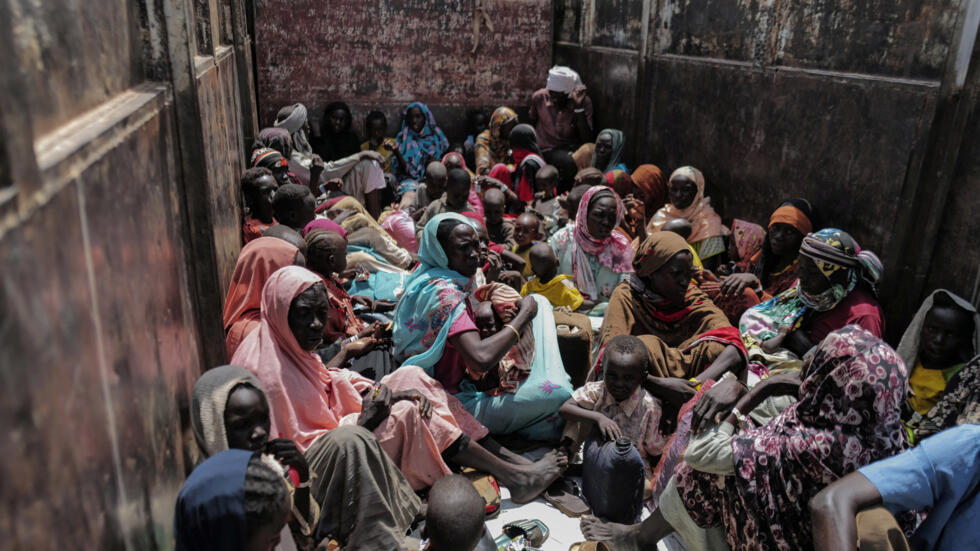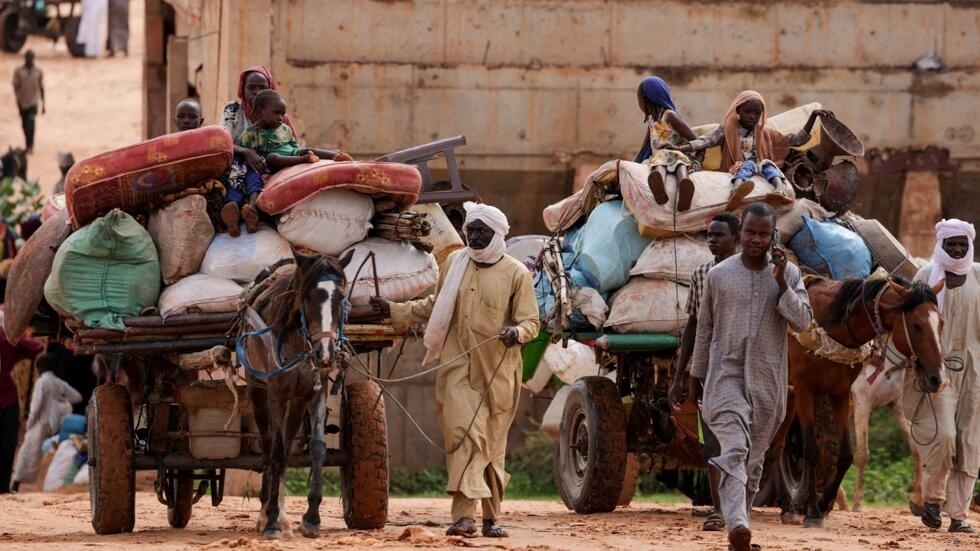Displaced people from Sudan
In recent years, Sudan has been experiencing an acute humanitarian crisis as a result of armed conflicts and growing political tensions, which has led to the displacement of a large number of residents. The crisis of displaced people from Sudan is one of the largest humanitarian crises in the world today, as thousands of Sudanese are living in difficult conditions far from their homes. This article deals with the causes of displacement in Sudan, the humanitarian conditions of the displaced, the impact of this crisis on Sudan and neighboring countries, in addition to the efforts made to address this problem.
Causes of displacement in Sudan
Armed conflicts
The conflict in Darfur:
Since 2003, an armed conflict has broken out in the Darfur region of western Sudan between the Sudanese government and some rebel groups that demanded more rights and development. This conflict, marked by extreme violence and accusations of war crimes and genocide, displaced millions of residents. The Sudanese government used Janjaweed militias, which were accused of committing large-scale atrocities against civilians. As a result of this conflict, many people have been forced to flee their homes and seek safer havens in other areas within Sudan or in neighboring countries.
Conflict in South Kordofan and Blue Nile:
Fighting has continued in the South Kordofan and Blue Nile regions since 2011 between the Sudanese government and the forces of the Sudan People’s Liberation Movement – North. The reason for this conflict is due to the demands of the armed movements for greater autonomy and development in marginalized areas. Military actions and violence in these areas caused the displacement of large numbers of residents who found themselves in constant confrontation with airstrikes and armed clashes, forcing them to leave their homes and look for safer areas.
Political crises
Turbulent political transition:
After the fall of the Omar al-Bashir regime in April 2019, Sudan entered a turbulent transition phase punctuated by mass protests and demonstrations against the transitional Military Council that took power. This period saw sporadic violence between security forces and protesters, creating political and security instability. In this context, some families had to be displaced due to concern about the deteriorating security situation.
Military coup in 2021:
In October 2021, the Sudanese army carried out a military coup that overthrew the transitional civilian government, further complicating the political and security situation in the country. Military movements and clashes between army troops and opponents of the coup led to the displacement of more residents who feared an aggravation of violence and instability.
Economic decline
Poverty and unemployment:
Sudan suffers from high rates of poverty and unemployment, as the country faces significant economic challenges exacerbated by internal conflicts and political instability. Many residents live in difficult economic conditions that make it difficult for them to secure their basic needs. Under these conditions, life in conflict-affected areas becomes untenable, prompting many to be displaced in search of better livelihood opportunities.
Lack of basic resources:
Many conflict-affected areas in Sudan suffer from severe shortages of basic resources such as clean water, food, and healthcare. These conditions cause a deterioration in the living conditions of local residents, forcing them to leave their homes and move to other areas in search of better living conditions. For example, the lack of Clean Water leads to outbreaks of waterborne diseases, which pose a significant threat to the life of the population and pushes them to displacement.

Humanitarian conditions for the displaced
Camps and lack of basic services
Life in the camps:
Many displaced Sudanese live in camps that lack basic infrastructure, making their daily lives challenging. Access to safe drinking water, food and health care is a major challenge in these camps. Camps often rely on humanitarian aid to meet the needs of the population, but this aid may be irregular or insufficient.
Poor health conditions:
The camps suffer from overcrowding and poor sanitary conditions, which increases the risk of the spread of infectious diseases. The lack of proper sanitation facilities and the absence of good sanitation make it difficult to maintain personal and public hygiene, leading to outbreaks of diseases such as diarrhea and cholera, especially among children and the elderly.
Education
Loss of educational opportunities:
Displaced children often lose the opportunity for education due to the lack of schools or the lack of teachers and educational equipment in the camps. This loss negatively affects the future of children and increases illiteracy rates in displaced communities.
Efforts to provide education:
Despite the efforts made by international and local organizations to provide education to displaced children, these efforts are often insufficient and unsustainable. Lack of funding, difficult access to camps, lack of proper educational infrastructure make it difficult to achieve significant progress in this area.
Safety and protection
Risks of violence and assaults:
Displaced people are at risk of violence and abuse, especially women and children who are vulnerable to sexual and physical exploitation and abuse. In overcrowded and unorganized camp environments, it becomes difficult to provide adequate protection to the population.
Limited security efforts:
Security efforts to protect the displaced are often limited due to a lack of resources and capabilities. The lack of security forces and proper training, as well as logistical challenges, hamper the ability to provide effective protection to the displaced.

Efforts to address the crisis
International humanitarian assistance
The role of international organizations:
Wfp (World Food Programme). ()).. These organizations distribute necessary foodstuffs, safe drinking water, medicines and health supplies, as well as set up educational centers for displaced children.
Financial and technical support:
International organizations are providing financial and technical support to the Sudanese government and local organizations to improve conditions in IDP camps. This support includes the construction and improvement of infrastructure such as sanitation and water facilities, the establishment of Health and education centers, and the training of humanitarian workers to improve the efficiency of the services provided.
Local initiatives
The role of civil society organizations:
Sudanese civil society organizations play an important role in providing support and assistance to the displaced through development and humanitarian projects. These organizations work to provide basic services such as food, water and health, in addition to providing psychological and social support to those affected.
Reconciliation and peace-building efforts:
Civil society organizations promote reconciliation and peace-building efforts in conflict-affected areas. These efforts include organizing workshops and community dialogues aimed at promoting understanding and cooperation between different communities, and providing training programs to enhance youth leadership and peacebuilding capabilities.
Negotiation and political solutions
Dialogue and negotiation:
The Sudanese government and its international partners are seeking political solutions to armed conflicts through dialogue and negotiation with rebel groups. These efforts are aimed at putting an end to armed conflicts and achieving lasting and sustainable peace in the country.
Achieving political and economic stability:
Achieving political stability and improving economic conditions can contribute to Reducing Displacement rates. The government, in cooperation with the international community, is working to implement political and economic reforms aimed at strengthening good governance and achieving sustainable development, creating a more stable and secure environment for the population
The IDP crisis in Sudan is a major humanitarian challenge that requires concerted local and international efforts to alleviate the suffering of the displaced and improve their conditions. The solutions provided must be comprehensive and sustainable, encompassing all humanitarian, economic and political aspects to achieve lasting stability and sustainable peace in Sudan. Cooperation and solidarity between different parties is the key to building a better future for the displaced and ensuring their basic human rights. Through integrated strategies that include providing humanitarian assistance, promoting reconciliation and peace-building, and supporting political solutions, we can achieve tangible progress in addressing this major humanitarian crisis.
The AHADs efforts to address the crisis
AHAD on the distribution of basic food and potable water to the displaced in the camps and affected areas. The association organizes periodic distribution campaigns to ensure that the displaced receive their food and water needs on an ongoing basis.
The association provides basic health care to the displaced through the establishment of mobile clinics and the provision of medicines and medical supplies. It is also working on implementing health awareness campaigns to prevent diseases and provide care for mothers and children.
Education and development
AHAD is one in providing education opportunities to displaced children through the establishment of educational centers and the provision of study materials and teachers. The association seeks to return children to school and ensure that their education continues despite the difficult conditions they live in.
The association provides vocational training programs for displaced people, aimed at enabling them to acquire new skills that enable them to improve their economic situation. These programs include training in handicrafts, agricultural skills and Information Technology.
sudan is one to promote dialogue between different communities in conflict-affected areas. It organizes workshops and community dialogues aimed at promoting understanding and cooperation between different communities, building bridges of communication and trust.
The association participates in reconciliation and peace-building efforts through cooperation with international and local organizations and the Sudanese government. The association provides technical and advisory support to initiatives seeking to achieve peace and stability in sudan
You can visit the AHAD website to find out more about the projects it offers
ALSO READ
WHAT THE FOOD BASKET CONTAINS IN AHAD
Join us in our message




